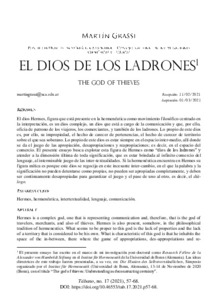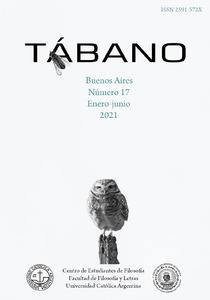Please use this identifier to cite or link to this item:
https://repositorio.uca.edu.ar/handle/123456789/11743| Título: | El dios de los ladrones The god of thieves |
Autor: | Grassi, Martín | Palabras clave: | HERMENEUTICA; INTERTEXTUALIDAD; LENGUAJE; COMUNICACION; Hermes Trismegisto | Fecha de publicación: | 2021 | Editorial: | Universidad Católica Argentina. Facultad de Filosofía y Letras. Centro de Estudiantes de Filosofía | Cita: | Grassi, M. El dios de los ladrones [en línea]. Tábano. 2021, 17. doi: 10.46553/tab.17.2021.p57-68. Disponible en: https://repositorio.uca.edu.ar/handle/123456789/11743 | Resumen: | Resumen: El dios Hermes, figura que está presente en la hermenéutica como movimiento filosófico centrado en la interpretación, es un dios complejo, un dios que está a cargo de la comunicación y que, por ello, oficia de patrono de los viajeros, los comerciantes, y también de los ladrones. Lo propio de este dios es, por ello, su impropiedad, el hecho de carecer de pertenencias, el hecho de carecer de territorio sobre el que sea soberano. Lo propio de este dios es estar siempre en el espacio inter-medio, allí donde se da el juego de las apropiación, desapropiaciones y reapropiaciones; es decir, en el espacio del comercio. El presente ensayo busca explotar esta figura de Hermes como “dios de los ladrones” y atender a la dimensión última de toda significación, que es estar brindada al infinito comercio del lenguaje, al interminable juego de las inter-textualidades. Si la hermenéutica encuentra en Hermes su figura mítica es porque este dios se regocija en este incesante inter-cambio, en el que la palabra y la significación no pueden detentarse como propias, no pueden ser apropiadas completamente, y deben ser continuamente desapropiadas para garantizar el juego y el pase de uno al otro, es decir, el diá-logo. Abstract: Hermes is a complex god, one that is representing communication and, therefore, that is the god of travelers, merchants, and also of thieves. Hermes is also present, somehow, in the philosophical tradition of hermeneutics. What seems to be proper to this god is the lack of properties and the lack of a territory that is considered to be his own. What is characteristic of this god is that he inhabits the space of the in-between, there where the game of appropriations, des-appropriations and reappropriations is played; the space of commerce, briefly said. This essay wants to explore the figure of Hermes as a “god of thieves” and examine this ultimate dimension of every meaning: its being given to the infinite commerce of language, to the unending game of inter-textuality. If hermeneutics finds in Hermes its mythical figure, it is because he rejoice in this permanent exchange in which words and meanings cannot be appropriated and must be des-appropriated if the game of infinite commerce is to be continued, that is, if the word is still in passing from one to the other, in an unending dia-logue. |
URI: | https://repositorio.uca.edu.ar/handle/123456789/11743 | ISSN: | 2591-572X (online) 1852-7221 |
Disciplina: | FILOSOFIA | DOI: | 10.46553/tab.17.2021.p57-68 | Derechos: | Acceso abierto | Fuente: | Tábano. 2021,17 |
| Appears in Collections: | TAB - 2021 nro. 17 |
Files in This Item:
| File | Description | Size | Format | |
|---|---|---|---|---|
| dios-ladrones-god-thieves.pdf | 218,93 kB | Adobe PDF |  View/Open | |
| cover.png | 694,25 kB | image/png |  View/Open |
Page view(s)
391
checked on Apr 30, 2024
Download(s)
199
checked on Apr 30, 2024
Google ScholarTM
Check
Altmetric
Altmetric
This item is licensed under a Creative Commons License

